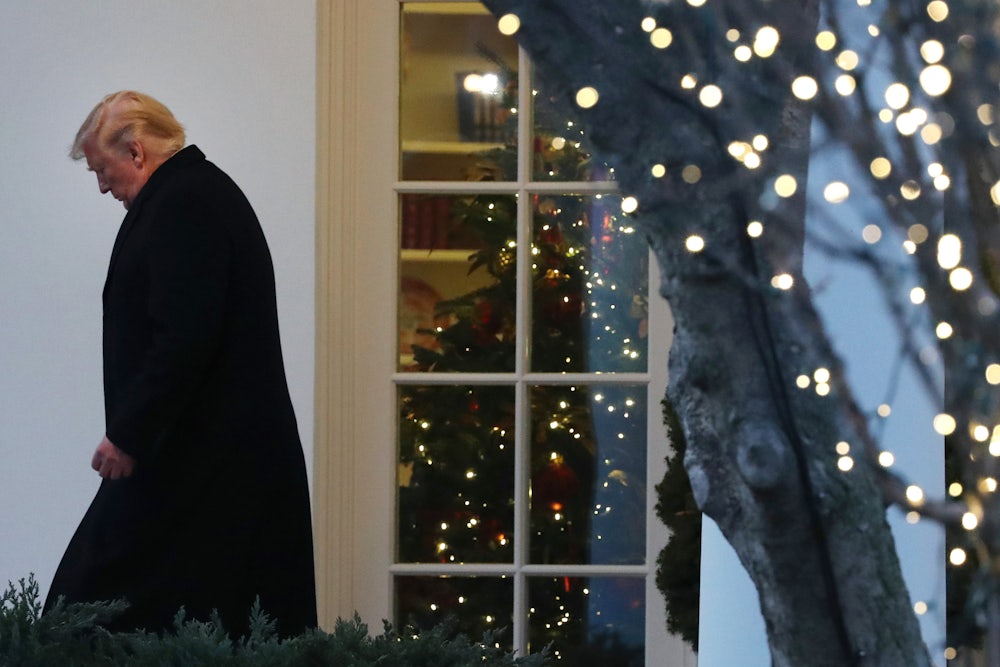A recurring theory is that President Donald Trump wants to be impeached, or that he is at least eager for the political brawl it represents. The New York Times’ Ross Douthat mused in September that Trump “might kind of want to be impeached” because, among other reasons, “the circus is the part of politics that he fundamentally enjoys.” Speaker Nancy Pelosi herself suggested in May that Trump “knows it’s not a good idea to be impeached, but the silver lining for him is then he believes that he would be exonerated by the United States Senate.”
That argument never made much sense. Impeachment is an irremovable stain on any presidency, and Trump knows it. On Tuesday night, he sent a letter to Pelosi to personally denounce the House’s imminent vote—just the third in the nation’s history. It is one of the strangest documents ever written by a president. The letter is alternatively a rant, a plea, a boast, a smear, a lie, and a threat—in other words, it is quintessentially Trumpian.
Trump framed the letter as a closing argument of sorts, one aimed at not only House lawmakers but also future generations of Americans. “While I have no expectation that you will do so, I write this letter to you for the purpose of history and to put my thoughts on a permanent and indelible record,” he wrote. “One hundred years from now, when people look back at this affair, I want them to understand it, and learn from it, so that it can never happen to another President again.”
It was an unusual tone for Trump, who rarely seems to contemplate his legacy or place in American history. The rest of the letter was more true to form. Trump characterizes the impeachment process and its backers as everything but criminal and treasonous. “By proceeding with your invalid impeachment, you are violating your oaths of office, you are breaking your allegiance to the Constitution, and you are declaring open war on American democracy,” he said.
The letter is six pages long. It would be half that length if Trump removed the personal insults aimed at Pelosi and her colleagues. He offers a litany of complaints: Democrats, he says, have “developed a full-fledged case of what many in the media call Trump Derangement Syndrome,” they “view democracy as [their] enemy” and have “decided to disgrace our country still further” instead of “putting our country first.” Many House Republicans made similar points in their floor speeches on Wednesday, assailing Democrats for orchestrating what they described as an illegitimate, partisan process.
Trump’s constitutional analysis was also unpersuasive at best. He claimed that the House’s “partisan impeachment crusade” was also “an unprecedented and unconstitutional abuse of power,” an “election-nullification scheme,” and a “terrible thing.” The first article of impeachment is “completely disingenuous, meritless, and baseless invention of your imagination,” while the second is “preposterous and dangerous.” Both articles are well supported by the evidence presented to lawmakers, and the House stands on solid constitutional footing in approving them.
There was even an I’m-rubber-and-you’re-glue moment, as if he viewed impeachment as some sort of insult that could be tossed back at those who leveled it. “You are the ones interfering in America’s elections,” Trump wrote. “You are the ones subverting America’s democracy. You are the ones obstructing justice. You are the ones bringing pain and suffering to our republic for your own selfish personal, political, and partisan gain.” It’s the same thinking that brought Trump to this moment. He had hoped, with Ukraine’s coerced help, to smear Biden and the Democrats with accusations of corruption and collusion that he’s faced for three years.
If Trump’s letter sought to energize his supporters or shore up his congressional allies, it was superfluous. If it was aimed at convincing House lawmakers not to make him the third impeached president in American history, it was unpersuasive. And if it truly hoped to convince Americans yet to be born that he has been wronged, it will fail. “For some, this vote may be hard,” Georgia Representative John Lewis, a hero of the civil rights movement, told the House on Wednesday. “But we have a mission and a mandate to be on the right side of history.” And if anyone knows a thing about that, it’s him.
